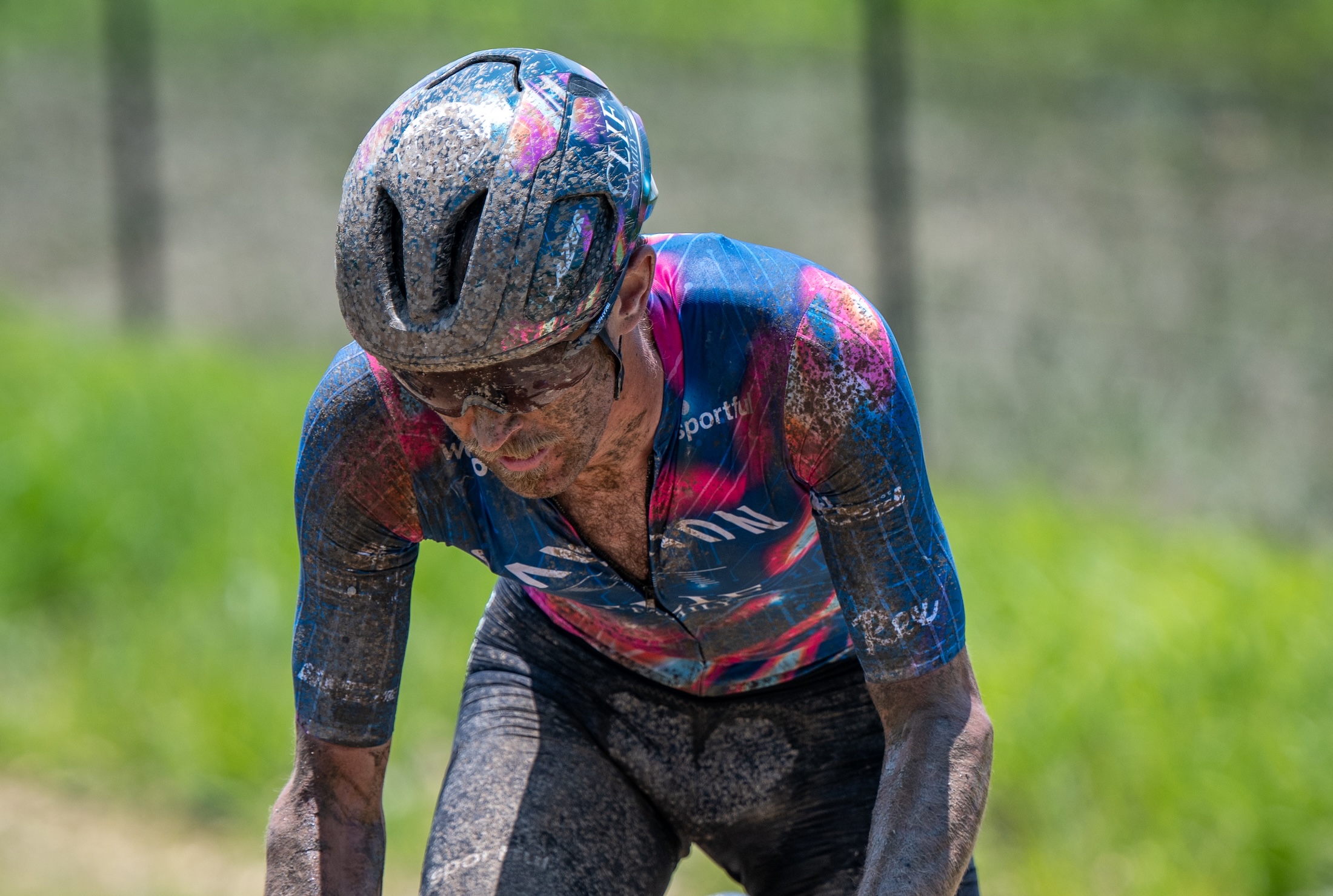The people’s champion: The unravelling of Tadej Pogacar's Tour de France and UAE's silver lining
Tadej Pogacar looked sick when he conceded the fight for the yellow jersey, but he wasn’t. He isn’t, according to his squad. In his own words, he was just “f—ked”
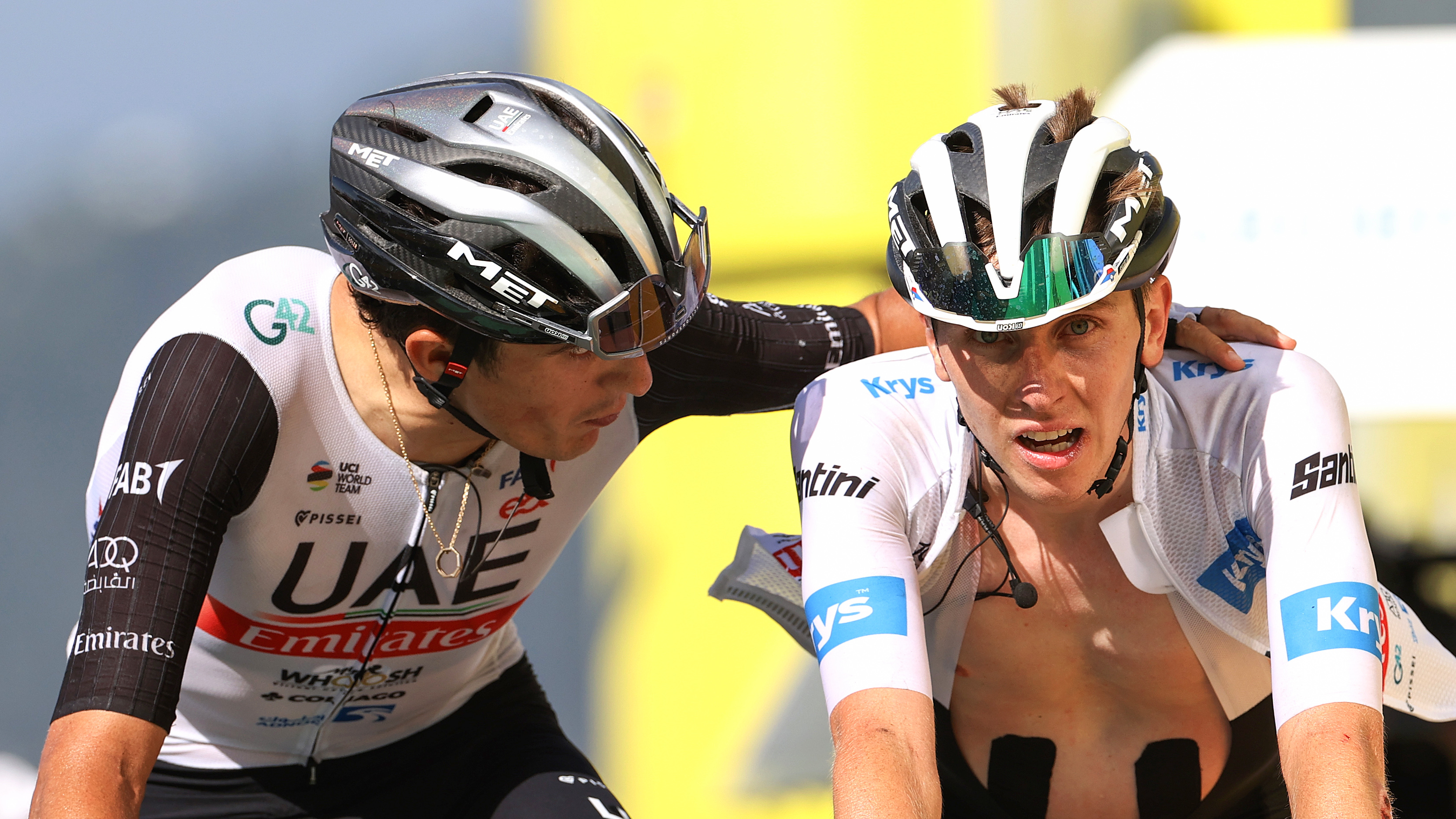
The latest race content, interviews, features, reviews and expert buying guides, direct to your inbox!
You are now subscribed
Your newsletter sign-up was successful
Silence is not a part of the constant, ear-ringing din that is the Tour de France but when Tadej Pogacar conceded his fight for the yellow jersey was over, cracking on the slopes of the Col de la Loze, there was a noticeable hush amongst the waiting masses at the finish.
People grimaced as TV cameras focused on the two-time champion getting dropped some 14.3km from the line, and then being paced by UAE Team Emirates teammate Marc Soler up the highest climb of this year’s race (2304m).
The youthfulness from Pogacar’s cherub face, as it had in the time trial the day before, where Jonas Vingegaard (Jumbo-Visma) laid a decisive and heavy blow, had been stripped. The 24-year-old looked ill. Dark circles further highlighted his deeply sunken eyes and starkly contrasted a ghostly pale complexion.
“I’m gone. I’m dead,” Pogacar said on race radio.
The next instruction: “Adam, fight for the podium.”
Soler paced Pogacar, and Rafal Majka supported teammate Adam Yates.
Pogacar looked sick, but he wasn’t. He isn’t, according to his squad. In his own words, he was just “f—ked”.
The latest race content, interviews, features, reviews and expert buying guides, direct to your inbox!
The Slovenian is a popular champion, with everyone, from fans to rival team managers and the press, rating his character and racing style.
“I’m a fan of Pogacar,” said Bora-Hansgrohe team manager Ralph Denk.
“Cycling needs these kinds of stars; they go to the cobblestone races, they go to the Ardennes classics, the Grand Tours, not just picking up the Tour and focusing on the Tour. This is what cycling needs, like back to the 70s and 80s, Eddy Merckx was racing all the big races.”
Pogacar is weighed and measured like no other in the peloton.
When he finished second to Vingegaard at the Tour last year, most questions from the press focused on his perceived loss in what, not dissimilarly to this season, was still a successful race for the all-rounder, who had then won three stages and marked a stint in the yellow jersey. His face lit up momentarily when one reporter focused on that, not the maillot jaune. He won two Tours before his 23rd birthday. He still qualifies for the best young rider classification, noting on the first rest day that this will be the last year that is so. The white jersey remains firmly on his shoulders, as it has since 2020, when he won his first Tour.
It wasn’t a surprise to UAE Team Emirates management or Pogacar’s teammates that he cracked as and when he did on stage 17.
According to Yates, who is third overall on general classification behind Vingegaard and Pogacar with three stages remaining, the team had been notified earlier that their co-leader wasn’t on-song.
“We had two guys in the front and Tadej already said on the climb before he wasn’t good,” Yates said at the start of stage 18. “So, we knew if he started to struggle, he would ride at his own pace and hopefully we could have someone come back from the break.
“The team said at the beginning that they wanted two guys on the podium and at the moment we have that.”
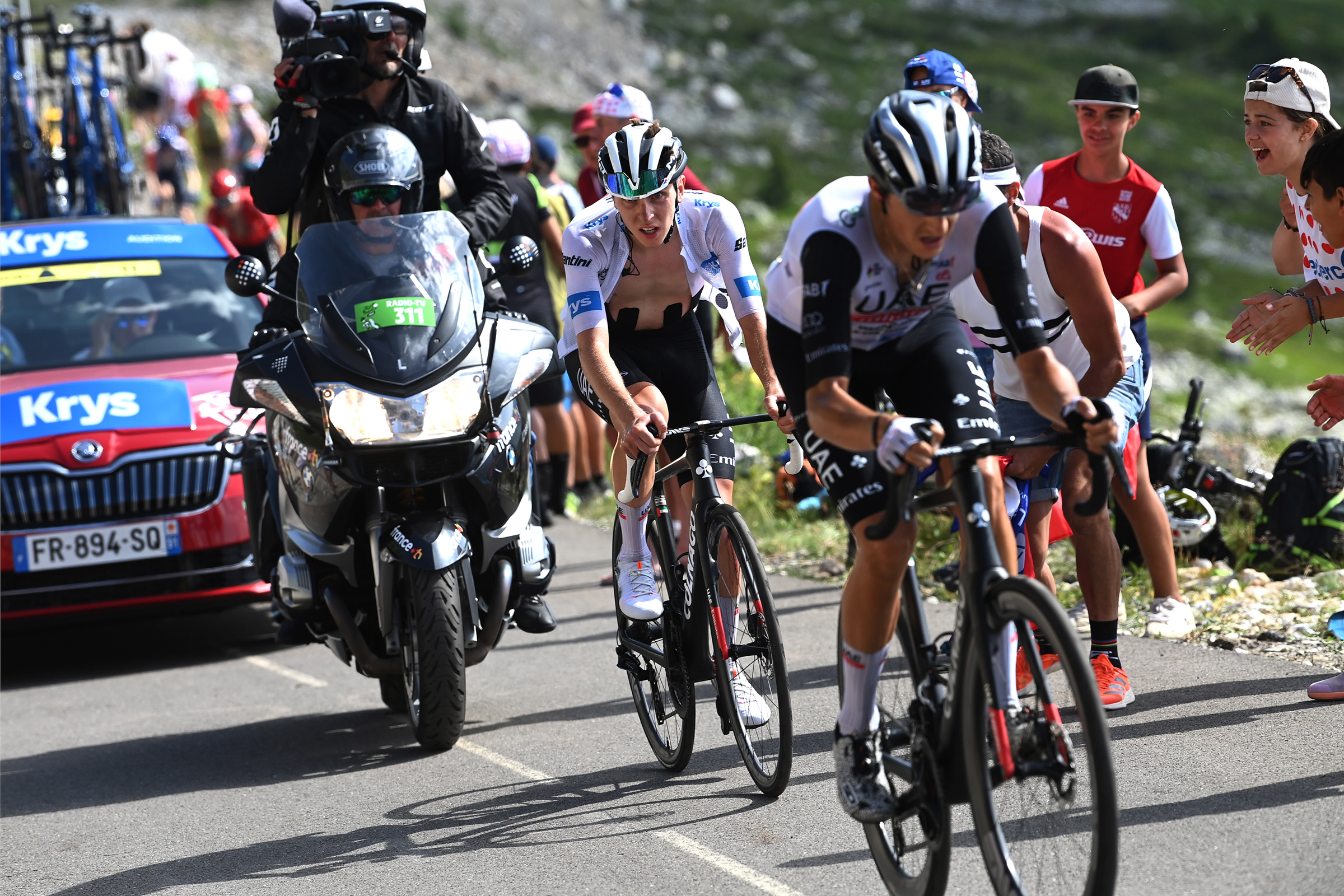
We had two guys in the front and Tadej already said on the climb before he wasn’t good
Guts and gusto
Pogacar raced the first two terms of the Tour as he usually does, with guts and gusto.
He answered a brief falter to Vingegaard on stage five with a commanding win the next day, and momentum seemed to be gathering in his favour as he slowly but surely pegged back, second, by second, the Dane’s then slender advantage.
Defending champion Vingegaard had repeated to media in his daily press conferences as the race leader that this Tour would not be decided in seconds, rather minutes. So, he obviously had a plan, or knew what was in his arsenal. But even when the 26-year-old put one minute and 38 seconds into his archrival to win Tuesday’s time trial, Jumbo-Visma were fully braced for a return swing.
“The Tour is not over at all,” Jumbo-Visma sports director Frans Maasen said. Moments later, team manager Richard Plugge echoed the sentiment.
“It’s a big relief but on the other hand Pogacar is like the Germans as we say in Holland, with football, you only beat them when they are in the bus back home. We are only celebrating when he is in Paris in the bus and he’s back to Ljubljana, and then we are sure,” Plugge said.
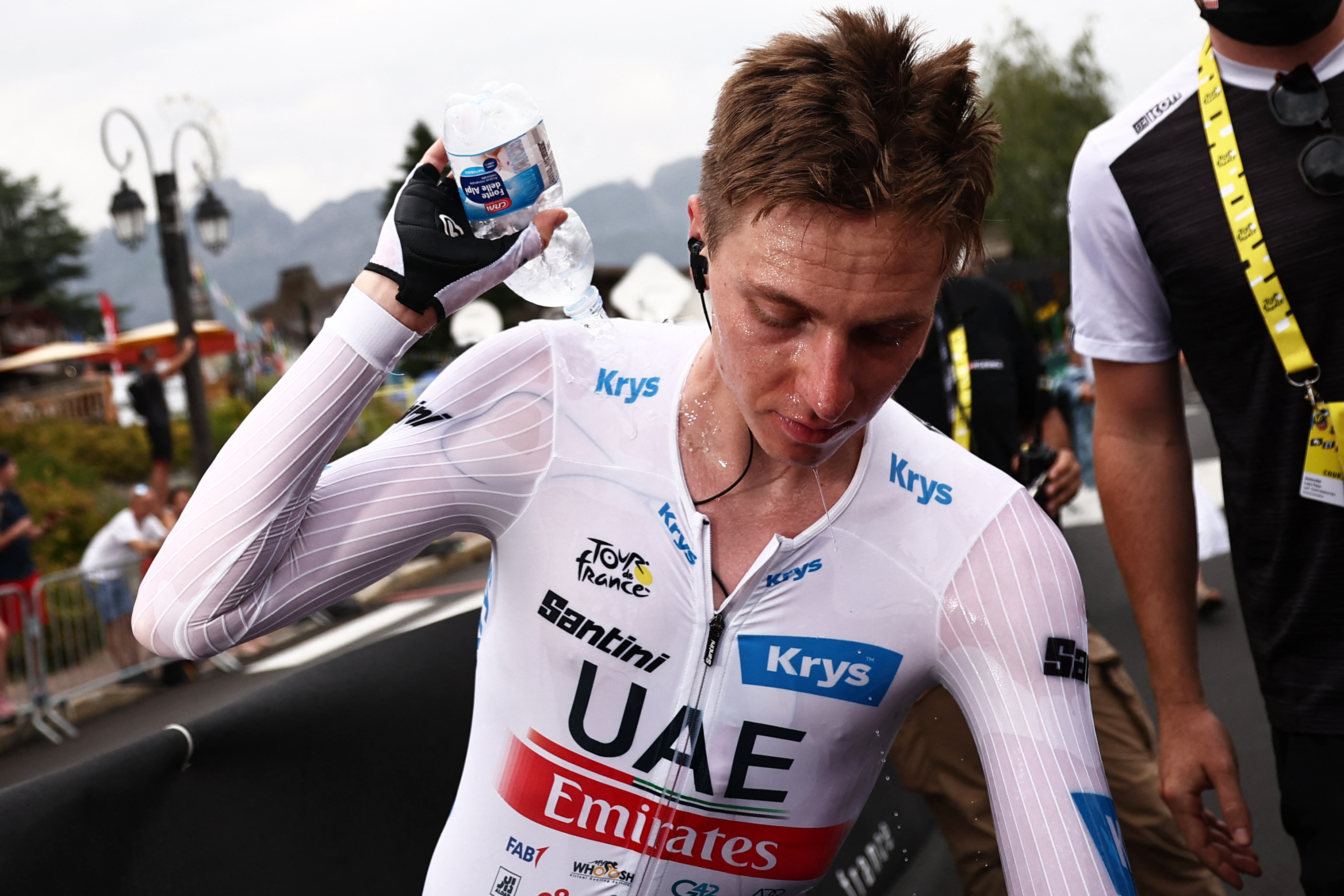
Tadej performed really well in the time trial… It was Jonas that did something incredible
“He will fight back, and that makes him one of the nicest competitors. And we try to fight him, and we are prepared to fight obviously.”
The silence that felled the Tour instead was a mark of respect to Pogacar, the once small, shy, boy now described as a showman of the sport, whose rare display of fallibility was met with collective sadness, if not grief.
Within the team though, the morale was, and is, still high. That’s one of Pogacar’s powers.
“Even when he has a bad day he’s always in a good mood, he’s always bringing good morale,” Yates said.
“It helps all of us, even when we’re suffering. It’s been a hard day, he’s always up for a laugh and a joke so for us he’s super easy to work with and for me he’s a big leader, when he brings morale like this, it helps the whole team.”
Mental point of view
UAE Team Emirates had sensed from the time trial that the yellow jersey this year might be beyond reach. Pogacar was good – third was Wout van Aert, who finished 2:51 down on his teammate - but not at his best. Vingegaard was flying.
“Honestly, we were more shocked about the result of the time trial,” UAE Team Emirates CEO Andrea Agostini. said as the dust settled on Thursday morning.
“We were aware that yesterday was a difficult day maybe. Tadej performed really well in the time trial… It was Jonas that did something incredible.
“But from a mental point of view for sure it was hard because we knew from that, that it was difficult to fight for the final GC, so maybe this is also something that maybe yesterday was stressed a little bit more than usual.”
What happened to Pogacar was human, after two-and-a-bit weeks of consecutive days racing, and on a climb that Soudal Quick-Step sports director Tom Steels described as a “never-ending story”.
“He was simply really tired, and he had a bad day in the digest situation,” Agostini said.
“He tried to eat but he wasn’t able to eat a lot. And after that he was pretty empty in the final.”
Pogacar’s 17 rounds with Vingegaard were so enthralling that it was easy to overlook the former entered the Tour with an injured wrist that wasn’t fully healed, and on the back of little racing.
“Everybody forget what happened to Tadej, that he just had a block of hard training before the Tour de France and he spent five weeks completely stopped from the bike,” Agostini said.
“Maybe when Vingegaard was training at altitude, he was running on the [Monaco hills].”
Pogacar won 13 times before he fractured his wrist at Liege-Bastogne-Liege, and was virtually unstoppable in the spring, claiming the Tour of Flanders, Amstel Gold Race and Fleche Wallonne.
After his DNF at Liege in April he competed only two times before the Tour, at his national road and time trial world championships in June, which he won.
“He transform abnormally normal, but it’s not normal,” Agostini said.
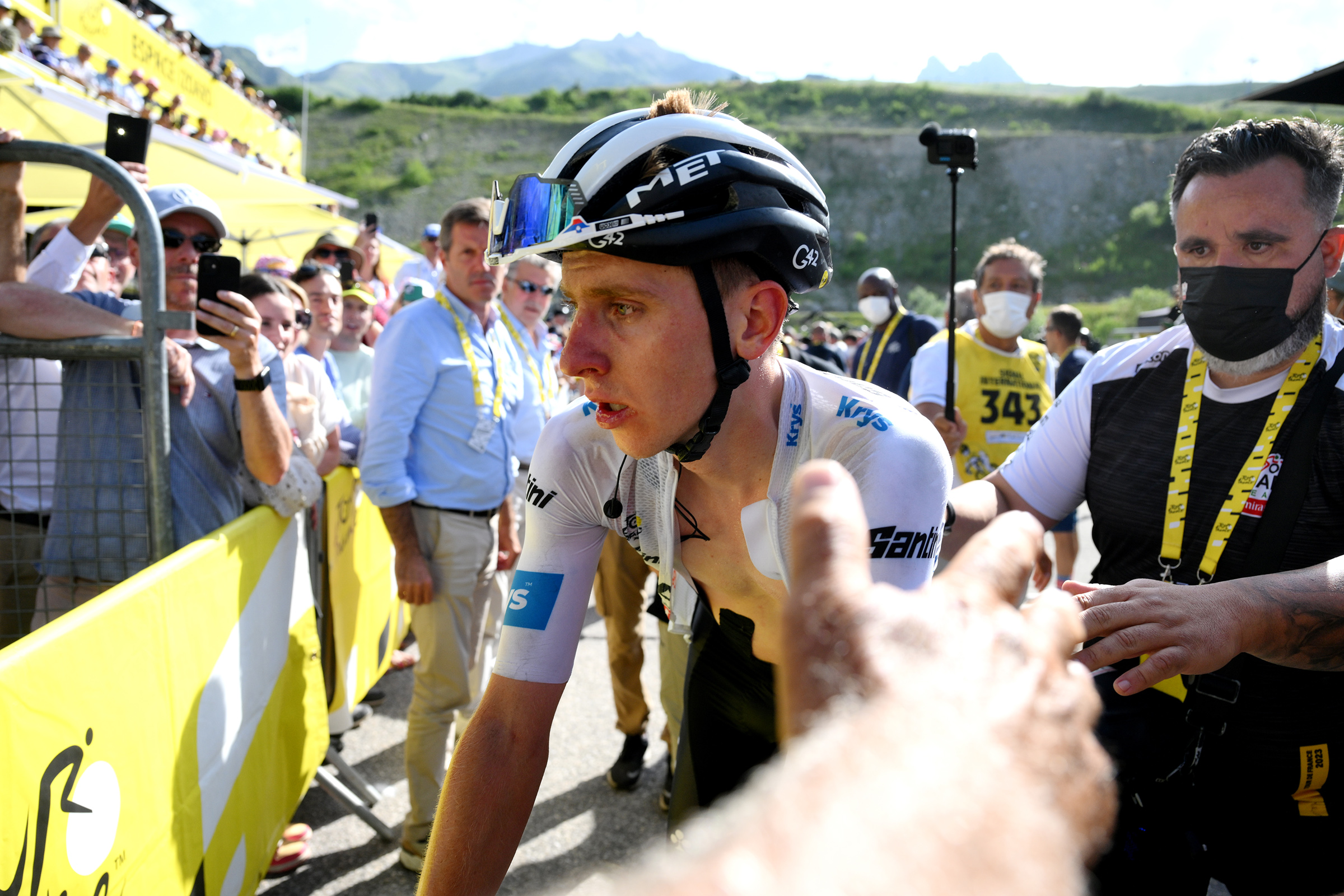
“Now we have to think that he is a normal guy, that he had a hard injury at the end of April and with a big goal in front of the season.
“If that happens to another rider, [and he] was able to be second in the Tour de France in the last week [it would be a success].”
Saturday’s penultimate stage will surely be hard-fought, with all climbers looking for a stage win, or if not to improve their position on general classification that Vingegaard has a commanding lead on – 7:35 ahead of Pogacar, and 10:45 on Yates.
UAE Team Emirates will be in the mix, as it continues to strengthen its roster, but this Tour is already a success for the team – with or without the yellow jersey. Pogacar and Yates have a stage each, with the latter also marking a stint in the maillot jaune.
“For us, it’s an absolutely good Tour de France. We have two riders fighting for the podium. If you are able to get second or third place in Paris it would be a really successful Tour de France,” Agostini said.
“We’ve never seen Adam Yates at this level, and this is a real good result we achieved like a team, and also the performance of all the team because you can see also yesterday Rafa Majka in the mountain maybe we were stronger than Jumbo. Jumbo were stronger maybe in the medium stage and the first stages. We fight with a really strong team, and we are proud of it.”
